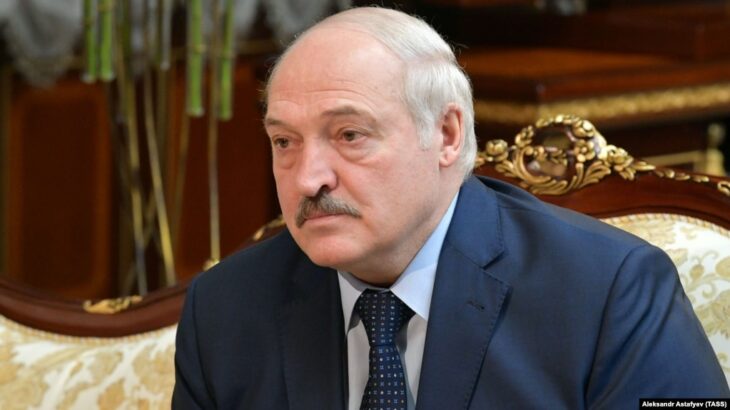
Belarusian strongman Alyaksandr Lukashenka has claimed he was the target of a U.S.-backed assassination plot, and Russian intelligence said that two Belarusians detained in Moscow this week were allegedly linked to the plot.
In his announcement on April 17, Lukashenka did not provide evidence to back up his claim. U.S. officials did not immediately respond to the allegations, while senior Belarusian opposition figures dismissed the report.
But the head of Belarus’s main security agency, the KGB, tied the alleged plot to an online Zoom discussion room last summer that featured Belarusian experts, along with several former law enforcement officials, discussing the country’s political situation.
Lukashenka, who has ruled Belarus for nearly three decades, has frequently accused Western countries of trying to topple him after he claimed victory in the August presidential election.
The allegations of the assassination plot also come with tensions soaring in neighboring Ukraine, as Russia masses troops along the eastern Ukraine border, and Kyiv warns of possible military intervention.
Russia is Belarus’s closest ally, and Moscow for years has sought to pull Minsk into a tighter union. But Lukashenka has resisted, fearing both a loss of Belarusian independence but also his authority.
Lukashenka said on state TV on April 17 that he and his children were the targets of the alleged assassination plot. He claimed it had been approved by “the top political leadership” of the United States, though he provided no evidence to back up the claim.
Lukashenka also said that Russian President Vladimir Putin said he had brought up the alleged plot in a recent phone call with U.S. President Joe Biden.
Opposition leader Svyatlana Tsikhanouskaya, who says she won a presidential election last August that Lukashenka claims to have taken in a landslide victory, said on April 18 that the allegation appears to be an act of “provocation” by Russian and Belarusian secret services.
Her team added in a statement that “there should be no jumping to conclusions that could harm the national interest, sovereignty and independence of Belarus” over the allegations.
Russia’s main domestic intelligence agency, the Federal Security Service, said the two Belarusians detained in Moscow this past week by Russian agents were allegedly part of that plot.
The two were identified as Yuras Zyankovich, a Belarusian-born lawyer who also holds U.S. citizenship, and Alyaksandr Fyaduta.
Zyankovich is a former regional leader of the opposition Belarusian Popular Front (BNF) party and once sought to be its presidential candidate. He has been living in the United States since 2007 but recently traveled to the Russian capital.
Zyankovich’s wife, Alena Dzenisavets, told RFE/RL on April 13 that Russian security officers “abducted” her husband from the Nordic Rooms Hotel in Moscow on April 11 and brought him to the Belarusian capital.
Fyaduta, who was Lukashenka’s spokesman when the Belarusian strongman was first elected president in 1994, worked as a media consultant in Moscow.
The Belarusian KGB had announced on April 13 that Fyaduta was in custody in Minsk.
The Federal Security Service (FSB) claimed that the detentions had prevented a military coup in Belarus planned for the May 9 Victory Day parade in Minsk, while Russia’s ONT TV reported that a coup was planned for June or July.
In its announcement on April 17, the FSB also claimed that the alleged plotters were advised in the United States and Poland.
Speaking on Belarusian TV, KGB chief Ivan Tertel said the alleged coup was discussed during an online Zoom conference last summer that included several former Belarusian law enforcement officials.
One participant, political scientist Alyaksandr Perepechka, told RFE/RL that he was surprised that authorities had accused the online chat as being a plot to overthrow Lukashenka. The chat was a recurring event, he said, and many people were invited to attend.
“On this platform, we discuss all possible and impossible options, opportunities, scenarios for overcoming the deep political in Belarus,” he said in an interview.
“A coup d’etat is the main way to get rid of bloody dictatorships,” he said. “It would be unprofessional to not discuss this problem and various scenarios of regime change in Belarus.”
But he said these discussions were academic, and theoretical, not actual planning.
“Getting funds and planning is a completely different matter,” he said.
Since the August election, Belarus has been gripped by unprecedented protest and political turmoil, with opposition groups saying it was a stolen election.
Belarusian security forces have arrested tens of thousands of people in a crackdown that has led to accusations of beatings and other rights abuses against demonstrators. The United States and the European Union have imposed sanctions against individuals and companies tied to Lukashenka’s regime.
Most prominent opposition leaders — including Tsikhanouskaya — have left the country.
The West has refused to accept Lukashenka’s victory, and few countries aside from Russia acknowledge him as president of Belarus.



